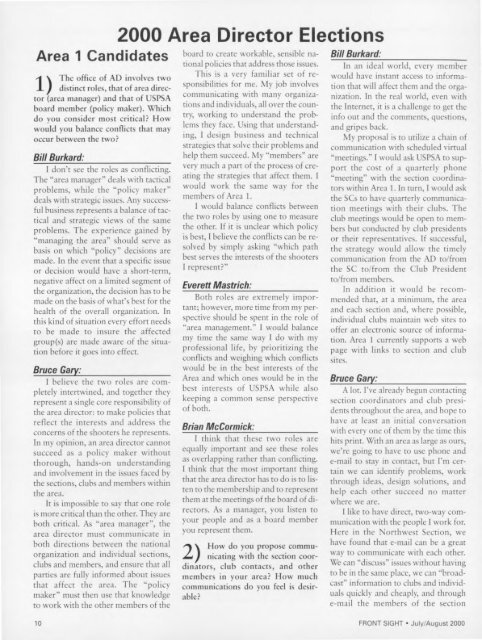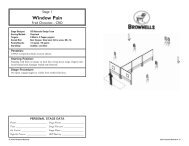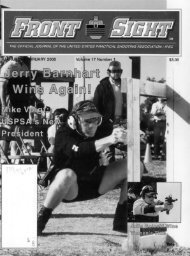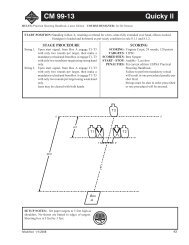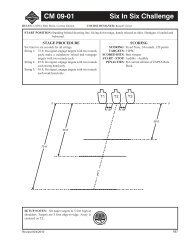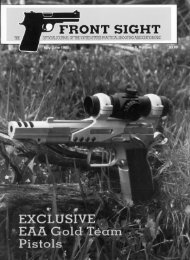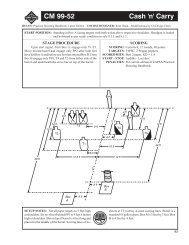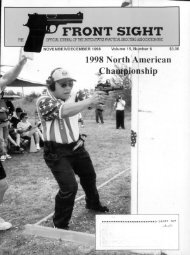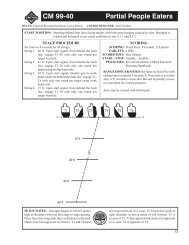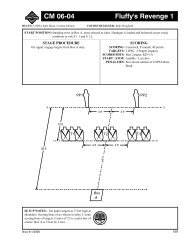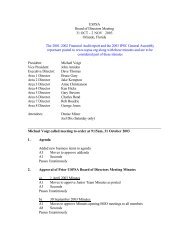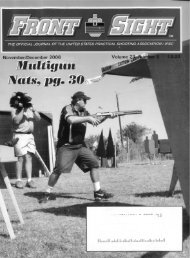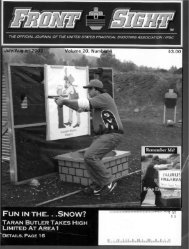You also want an ePaper? Increase the reach of your titles
YUMPU automatically turns print PDFs into web optimized ePapers that Google loves.
Area 1 Candidates<br />
) he office of AD involves two<br />
1 distinct roles, that of area director<br />
(area manager) and that of USPSA<br />
board member (policy maker). Which<br />
do you consider most critical? How<br />
would you balance conflicts that may<br />
occur between the two?<br />
Bill Burkard:<br />
I don't see the roles as conflicting.<br />
The "area manager" deals with tactical<br />
problems, while the "policy maker"<br />
deals with strategic issues. Any successful<br />
business represents a balance of tactical<br />
and strategic views of the same<br />
problems. The experience gained by<br />
"managing the area" should serve as<br />
basis on which "policy" decisions are<br />
made. In the event that a specific issue<br />
or decision would have a short-term,<br />
negative affect on a limited segment of<br />
the organization, the decision has to be<br />
made on the basis of what's best for the<br />
health of the overall organization. In<br />
this kind of situation every effort needs<br />
to be made to insure the affected<br />
group(s) are made aware of the situation<br />
before it goes into effect.<br />
Bruce Gary:<br />
I believe the two roles are completely<br />
intertwined, and together they<br />
represent a single core responsibility of<br />
the area director: to make policies that<br />
reflect the interests and address the<br />
concerns of the shooters he represents.<br />
In my opinion, an area director cannot<br />
succeed as a policy maker without<br />
thorough, hands-on understanding<br />
and involvement in the issues faced by<br />
the sections, clubs and members within<br />
the area.<br />
It is impossible to say that one role<br />
is more critical than the other. They are<br />
both critical. As "area manager", the<br />
area director must communicate in<br />
both directions betvveen the national<br />
organization and individual sections,<br />
clubs and members, and ensure that all<br />
parties are fully informed about issues<br />
that affect the area. The "policy<br />
maker" must then use that knowledge<br />
to work with the other members of the<br />
2000 Area Director Elections<br />
board to create workable, sensible national<br />
policies that address those issues.<br />
This is a very familiar set of responsibilities<br />
for me. My job involves<br />
communicating with many organizations<br />
and individuals, all over the country,<br />
working to understand the problems<br />
they face. Using that understanding,<br />
I design business and technical<br />
strategies that solve their problems and<br />
help them succeed. My "members" are<br />
very much a part of the process of creating<br />
the strategies that affect them. I<br />
would work the same way for the<br />
members of Area 1.<br />
I would balance conflicts between<br />
the two roles by using one to measure<br />
the other. If it is unclear which policy<br />
is best, I believe the conflicts can be resolved<br />
by simply asking "which path<br />
best serves the interests of the shooters<br />
I represent?"<br />
Everett Mastrich:<br />
Both roles are extremely important;<br />
however, more time from my perspective<br />
should be spent in the role of<br />
"area management." I would balance<br />
my time the same way I do with my<br />
professional life, by prioritizing the<br />
conflicts and weighing which conflicts<br />
would be in the best interests of the<br />
Area and which ones would be in the<br />
best interests of USPSA while also<br />
keeping a common sense perspective<br />
of both.<br />
Brian McCormick:<br />
I think that these two roles are<br />
equally important and see these roles<br />
as overlapping rather than conflicting.<br />
I think that the most important thing<br />
that the area director has to do is to listen<br />
to the membership and to represent<br />
them at the meetings of the board of directors.<br />
As a manager, you listen to<br />
your people and as a board member<br />
you represent them.<br />
t t uh t phr eo ps oe cs t ei oc no mc omo ur =<br />
2) Hnic°atindg° wy o<br />
dinators, club contacts, and other<br />
members in your area? How much<br />
communications do you feel is desirable?<br />
Bill Burkard:<br />
In an ideal world, every member<br />
would have instant access to information<br />
that will affect them and the organization.<br />
In the real world, even with<br />
the Internet, it is a challenge to get the<br />
info out and the comments, questions,<br />
and gripes back.<br />
My proposal is to utilize a chain of<br />
communication with scheduled virtual<br />
"meetings." I would ask USPSA to support<br />
the cost of a quarterly phone<br />
"meeting" with the section coordinators<br />
within Area 1. In turn, I would ask<br />
the SCs to have quarterly communication<br />
meetings with their clubs. The<br />
club meetings would be open to members<br />
but conducted by club presidents<br />
or their representatives. If successful,<br />
the strategy would allow the timely<br />
communication from the AD to/from<br />
the SC to/from the Club President<br />
to/from members.<br />
In addition it would be recommended<br />
that, at a minimum, the area<br />
and each section and, where possible,<br />
individual clubs maintain web sites to<br />
offer an electronic source of information.<br />
Area 1 currently supports a web<br />
page with links to section and club<br />
sites.<br />
Bruce Gary:<br />
A lot. I've already begun contacting<br />
section coordinators and club presidents<br />
throughout the area, and hope to<br />
have at least an initial conversation<br />
with every one of them by the time this<br />
hits print. With an area as large as ours,<br />
we're going to have to use phone and<br />
e-mail to stay in contact, but I'm certain<br />
we can identify problems, work<br />
through ideas, design solutions, and<br />
help each other succeed no matter<br />
where we are.<br />
I like to have direct, two-way communication<br />
with the people I work for.<br />
Here in the Northwest Section, we<br />
have found that e-mail can be a great<br />
way to communicate with each other.<br />
We can "discuss" issues without having<br />
to be in the same place, we can "broadcast"<br />
information to clubs and individuals<br />
quickly and cheaply, and through<br />
e-mail the members of the section<br />
10 FRONT SIGHT • <strong>Jul</strong>y/<strong>Aug</strong>ust 2000


